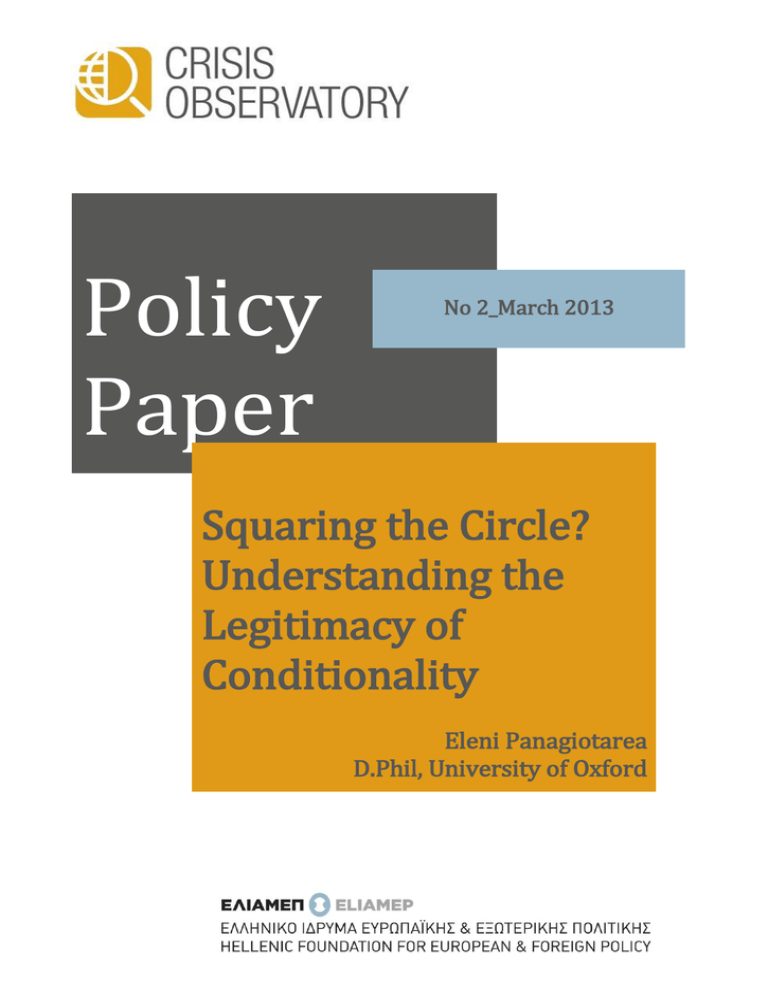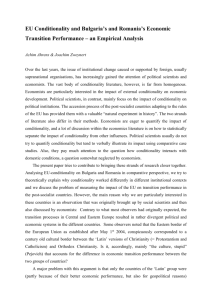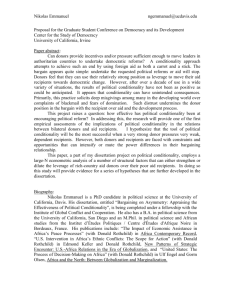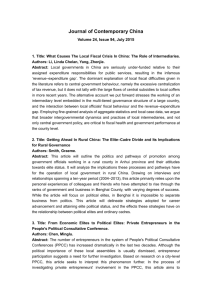
Policy
Paper
No 2_March 2013
Squaring the Circle?
Understanding the
Legitimacy of
Conditionality
Eleni Panagiotarea
D.Phil, University of Oxford
Copyright © 2013
Hellenic Foundation for European and Foreign Policy (ELIAMEP)
49, Vas. Sofias Avenue, 106 76 Athens Greece
Tel.: +30 210 7257 110 | Fax: +30 210 7257 114 | www.eliamep.gr | eliamep@eliamep.gr
CRISIS OBSERVATORY | www.crisisobs.eu | info@crisisobs.gr
All Rights Reserved
Squaring the Circle? Understanding the Legitimacy of
Conditionality
Eleni Panagiotarea
Dr Eleni Panagiotarea, DPhil (Oxon) is a policy analyst, specialising in EMU economic governance,
European political economy and national economic policy, having worked in the Greek financial sector
and as an advisor for the Ministries of Foreign Affairs and Finance. She has recently edited a special
issue on ‘The Politics of the Euro Crisis’ for the Greek Political Science Review. She is currently the
recipient of an Onassis Public Benefit Foundation Research Grant to inquire into the effects of the Euro
crisis on democratic processes of economic policy formation and implementation. She is also a
Research Associate for the Hellenic Foundation for European and Foreign Policy (ELIAMEP), where she
is working on issues of economic governance and debt sustainability. Her book ‘Greece in the Euro:
Economic Delinquency or System Failure?’ is to be published by ECPR Press in 2013.
ELIAMEP offers a forum for debate on international and European issues. Its non-partisan character
supports the right to free and well-documented discourse. ELIAMEP publications aim to contribute to
scholarly knowledge and to provide policy relevant analyses. As such, they solely represent the views of the
author(s) and not necessarily those of the Foundation.
2
Squaring the Circle? Understanding the Legitimacy of Conditionality
Eleni Panagiotarea
Περιεχόμενα
Introduction ................................................................................................................................................. 5
1. Closing the Gap? The National Level ................................................................................................... 5
2. Bridging the two zones, ‘core’ and ‘periphery’ ........................................................................................ 8
Conclusion: Ignore at your own risk ........................................................................................................... 9
Bibliography .............................................................................................................................................. 10
About the Crisis Observatory .................................................................................................................... 11
3
Squaring the Circle? Understanding the
Legitimacy of Conditionality
Eleni Panagiotarea
Περίληψη
Η έννοια της τήρησης των προϋποθέσεων- ως αντάλλαγμα για την παροχή βοήθειαςέρχεται στο προσκήνιο προκειμένου να αποφευχθεί ο ηθικός κίνδυνος και να δημιουργηθεί
η δημιουργία στους φορολογούμενους στις χώρες-πιστωτές θα λάβουν πίσω τα χρήματά
τους. Μπορεί όμως ποτέ να νομιμοποιηθεί ‘στο έδαφος’, όταν οι πολίτες των χωρών υπό
διάσωση καλούνται να αποδεχτούν προγράμματα λιτότητας, στα οποία οι κυβερνήσεις
τους-πόσο μάλλον τα κοινοβούλιά τους- έχουν περιορισμένη συνεισφορά ενώ τα ίδια τα
προγράμματα παράγουν ύφεση και υψηλά ποσοστά ανεργίας αντί για ανάπτυξη-κρίσιμη
για τη βιωσιμότητα του χρέους. Η υπό όρους χορήγηση βοήθειας πρέπει, σύμφωνα με το
κείμενο αυτό πολιτικής, να προσαρμόζεται αποτελεσματικά στις εθνικές ανάγκες- ώστε να
αποφεύγονται φαινόμενα πολιτικής αποσταθεροποίησης και κοινωνικού χάους, ενώ η
εφαρμογή της πρέπει, κατ’ ελάχιστον να διασφαλίζει τη δίκαιη κατανομή βαρών στον
πληθυσμό.
Abstract
Avoiding moral hazard and making sure that tax payers of creditor countries get their money
back have brought the concept of conditionality-setting conditions in exchange of financial
aid- to the fore. Can it ever be legitimated on the ground, when citizens of bailout countries
have to accept austerity programmes in which their governments, let alone parliaments,
have had limited input and when they appear to defeat their own purpose by generating
recession and high levels of unemployment rather than growth- critical for debt
sustainability. Conditionality, this paper argues, needs to be effectively fine-tuned to
national needs- to avoid political instability and social havoc-, while its implementation
must, at a minimum, guarantee a fair sharing of burdens among the population.
Key Words:
Austerity, Bailout, Conditionality, Democracy, Legitimacy
4
Squaring the Circle? Understanding the Legitimacy of Conditionality
Eleni Panagiotarea
Introduction
Can conditionality ever be legitimated? After all, it involves the imposition of typically
stringent conditions, by unelected officials, in exchange for financial aid. In this respect, it
meddles with national democratic processes of policy formation and policy targetingparticularly in the area of government public spending-, tends to degrade the role of
parliaments to that of swiftly ratifying documents, and removes the critical element of
upholding or withholding popular support from externally-induced adjustment programmes.
Two interesting parameters arise here: first, conditionality constitutes a form of ‘coerced’
acquiescence, in the sense that the government in question is left with very little options but
to accept the proposed conditions and second, for conditionality of this type to actually
acquire legitimacy, acquiescence must somehow transform into ‘voluntary compliance’
(Scharpf, 2007); voters facing potentially life-changing circumstances (including recession,
higher incidence of unemployment and reduced social benefits) have to abide to
‘agreements’ in which they have not been properly consulted and by which they probably
stand to lose.
This is, at least, one side of the story. Conditionality would have been unnecessary, one may
well argue, if governments were fiscally prudent or if they had resisted the temptation to
play along with the debt-fuelled model of economic growth. Gross irresponsibility (Tsoukalis,
2011) on the part of the governments however cannot and should not breed lack of
accountability on the part of the donors. There is a very real issue of how conditionality fares
‘on the ground’, which is typically omitted or scarcely brought up in public debate. What
happens when those setting the conditions get it wrong? What if the programmes
‘proposed’ prescribe the wrong medicine, based on poor or misguided advice? At the very
least, conditionality must be seen to be working, if it is to be accepted. With donors’
accountability a moot point and traditional channels of accountability among governments
and their citizens potentially disrupted –economic decisions that impact their lives are, after
all, removed from the democratic process- conditionality must also be seen to be working
for them. The policy paper that follows proposes an analysis of ‘gaps’ in the legitimacy of
conditionality, at the national and Eurozone level, discussing possible remedies.
1. Closing the Gap? The National Level
-Major injustices have been committed in the name of deficit reduction and promoting
budget consolidation. While the creation of a stable and equitable fiscal framework, with
rules quantifying the medium-term fiscal path in binding multi-year budgets has become a
typical response, what has generally been lacking is a public commitment that the ‘reformed’
framework will operate for a fixed period- no exceptions or ad hoc regulations. Voters have a
right to make informed economic decisions on the basis of the (after-tax) income earned;
more importantly, they have a right to know which of the ‘temporary’ or ‘one-off’ taxes will
be abolished or become ‘permanent’; the same applies for retrospective taxes which can
reduce citizens’ (and corporations’) trust in the system, unless backdating legislation is used
exceptionally to address artificial tax planning or aggressive tax avoidance schemes. Setting
an example is always a good strategy: with citizens experiencing forced quality of life
5
sacrifices as a result of austerity programmes, total government spending must be anchored
in firm and binding expenditure ceilings; in this way, the damage done to the social fabric by
previous over-spending (with the creation of unsustainable lifestyles and the wasteful
transfer of public funds into undeserving beneficiaries) can begin to be rectified. In an
ongoing reform process, governments need to visibly link their efforts with both an
appropriate distribution of tax burdens- ensuring that certain sections of society are
‘sheltered’ (and not just those living at the poverty line)- and improving the quality of public
services. The prevalent conception- a primary budget surplus is the panacea to all evils- will
simply not work, particularly in countries, where the record of taxpayer compliance is mixed,
creating a de facto imbalance in burden sharing.
- Tax evasion lies at the heart of equity and efficiency failures- with ‘conditionality’ expected
to promote good governance and economic efficiency. Allowing for the adverse recession
effects- forcing workers to make a living on the black market economy, burdening the social
security systems with unemployment benefits and reducing income tax and corporate
income tax revenue, the culture of voluntary compliance with regulation has predictably, in
countries with inefficient tax administrations and unstable penalty systems, not been
working. The major danger in keeping up with ‘conditionality’ is creating ‘new’ institutions
or agencies and supposedly investing them with ‘political autonomy’ in tackling tax evasion,
when, in reality, finance ministries maintain in place a system of weak tax governance (weak
incentives for compliance, combined with understaffed and under-resourced agencies). No
new structure for increasing tax revenue will work under circumstances where hiring is
political, co-ordination between it and penalty-enforcing agencies is low, and measures for
tax collecting are not targeted- indexed on the basis of ‘urgency’, that is timely/immediate
enforceability of payments and size of payments. When tax collection is consistently suboptimal, embedded in a political culture where the avoidance of penalties detected is high,
the best possible strategy is for the government to act pre-emptively and minimize tax
evasion opportunities at various levels of economic activity. This involves targeting persistent
categories of tax evaders, typically the self-employed, small business, and sole
proprietorships, introducing anti-avoidance rules that ‘bite’ automatically and cutting down
on loopholes and exemptions, which augment the ability to evade. Casting the net wider, it
also calls for limiting the use of cash for a range of transactions-the technical possibility
created by IT systems of matching electronic payments with declared income can work as a
deterrent, particularly if the tax evaders become persuaded that it will work. Governments
should seek to re-examine the number of tax reliefs existing to encourage investment
against quantifiable tax revenue earned, while dispensing with tax amnesties. For all the
favourable reviews, a simple system of tax governance delineating clear lines of
accountability will not be sufficient on its own - officials with poor records of auditing and
persecuting need to be publicly reprimanded and removed from their positions. Public
perceptions of the fairness of the system and its operation are, in fact, critical for meeting
the expectations of citizens burdened by continuously rising taxes and by shrinking welfare
state provisions. Equality of treatment goes a long way to bridging the gap between
government obligations under adjustment programmes and citizens’ broader acceptance of
the fiscal consolidation effort.
6
Squaring the Circle? Understanding the Legitimacy of Conditionality
Eleni Panagiotarea
-Structural adjustment cuts deep into national policy formation, as it theoretically generates
a fundamental re-orientation of the role and size of the state in the economy. It is fair to
refer to a ‘standard’ structural adjustment model- one only need to read through the
economic programmes of Greece, Ireland, and Portugal (European Commission, 2012)which takes little note of conditions on the ground, including the institutional capacity to
deliver and whether a social and or political consensus exists. There is, conceptually at least,
an antidote; ‘country ownership’ of reforms is held to pass implementation on to the hands
national governments, hence ensuring the democratic character of often painful cuts,
including the slashing of pensions and the minimum wage-hence, lack of or limited ‘country
ownership’ can be easily blamed policy failure, whitewashing external responsibility. In
programme countries, previously politically unheard of reforms have been undertaken with
varying degrees of success in public administration, health and pension systems, competition
frameworks, industrial relations, labour markets, energy markets, network industries,
service sectors and in the regulated professions. Getting the laws passed and putting the
new rules in effect have been typical responses-actual implementation, however, has
habitually stumbled upon very national calculations of what is politically feasible. Moving
beyond that requires a major leap forward, involving visible improvement in both the
countries’ growth prospects- a difficult feat, as structural adjustment effects take root in a
rather long-term framework-and in citizens’ appraisal of whether equity and efficiency have
been promoted; hence, governments need to design measures with a goal to reduce rentseeking and fight vested interests’ distortion in product markets- making sure, for example,
that labour cost competitiveness gains pass into price competitiveness gains. Reduced
services, rising unemployment, job insecurity, lower social spending- the short-term effects
of structural adjustment- must at least be balanced out with a major public campaign to
fight corruption in various interfaces of citizen-public agencies’ interaction, to control
inefficiency in service delivery and, as a result, really shelter the most vulnerable. Horizontal
measures are detrimental in this respect, while efforts must be made to introduce a scale
system in the apportioning of social and health services and unemployment benefits. Only if
corruption and legal complexity are seriously cut back, a level-playing field is createddispensing with capture, patronage, and clientelism- and a stable tax regime instituted, can
the business environment bounce back and public trust be restored. To this end,
governments are well advised to consider, in the design of their programmes, both
traditional sources of government failure (to avoid repeating them) and good practices, at
local or national level to adopt.
-‘Conditionality’ is a heavily laden concept, revoking images of reforms being imposed from
above; ignorance about its logic exacerbates the negative connotations of its intrinsically
top-down approach. What is at stake, therefore, is the development of a fair narrative of
conditionality, one that explains the obligations that inadvertently come packaged with a
loan; for one, ‘conditionality’ is meant to act as a ‘guarantee’ against the prevalent criticism
that bailouts can actually contribute to crisis by creating moral hazard. While governments
cannot appeal to this argument- it would amount to political suicide- they can be more vocal
about having the opportunity to re-shift their growth models, from domestic demand toward
investment and market expanding exports. Revamping domestic economies that failed and
having a scapegoat to do so is not a bad deal politically. After all, gains and losses in political
7
legitimacy in contemporary liberal democracies have largely been associated with the ability
(or lack of) of governments to create jobs with acceptable wages, promote sufficient
economic growth, and maintain a decent welfare state.
2. Bridging the two zones, ‘core’ and ‘periphery’
The relationship between governments and their electorates is not the only one currently
being affected. Imposing conditions externally comes with further costs, particularly for
members comprising a less than perfect monetary union. The open and very public division
between creditor and debtor countries is hardly conducive to legitimising conditionality,
particularly when ‘who is to blame’ questions often fail to consider the very substantive
divergences in the competitive positions and current-account balances that were allowed to
build up over the last decade (Pisani-Ferry, 2012) . At this critical stage, gaining a sense of a
‘union’ vis-à-vis the Eurozone crisis is imperative to both guaranteeing the cohesiveness and
legitimating the European project.
-Swallowing the bitter austerity medicine and the conditionality that goes with it has been
an essentially asymmetrical process. Burden sharing has been absent, with deficit countries
expected to fight recession (or low growth), unprecedented rates of unemployment, and
worsening debt burdens for the greater good of saving the single currency. Even if progress
has been made- external imbalances have improved and unit labour costs have come down-,
this is, in the long-run, an unsustainable situation; the internal devaluations that have been
under way cannot be expected to last forever, particularly as surplus countries refuse to
undergo devaluations of their own, through rising prices for example. This asymmetry in
effort insults both the people of the deficit countries who have been experiencing severe
and sustained attacks on their income and their political systems as they crumble under the
weight of budgetary consolidation. The answer that has been proposed, strengthening
economic and budgetary co-ordination, through more fiscal tightening and bigger sanctions,
falls short of a monetary union intent on ensuring that policies are responsive to the
preferences (Follesdal and Hix, 2006) of all its members, equally and with equal respect. Coordination in this respect should acknowledge the distributional implications that some
states and their citizens have been forced to absorb on account of EMU design and lack of
fit. To avoid the de facto creation of a two-tier citizenship across the union, conditionality
must be offset with a co-ordinated response of both deficit and surplus countries, proposing
a fairer adjustment of intra-euro-area competitiveness and macroeconomic rebalancing.
-At the same time, tax payers in the north feel that they are also being by-passed, as their
political leaders have authorised one bailout programme after another. A sense of lack of
control over the democratic process is made worse by the mixed if not shaky results of the
bailouts; worse, the politics of austerity seem to be taking hold in the core- complete with
the new economic orthodoxy that cutting government spending is the key to restoring or
maintaining investors’ confidence. European elites purport to legitimise the process by
invoking conditionality (Draghi, 2012) and by creating a new set of rules on enhanced EU
economic governance. This amounts, for citizens in debtor and creditor countries alike, to
8
Squaring the Circle? Understanding the Legitimacy of Conditionality
Eleni Panagiotarea
transferring more powers to Europe without treaty change (which would at least involve the
consent of member states and the derivative compliance confirming it) or some other form
of binding citizen endorsement, including national referenda (which have had a rather poor
showing in the history of European integration). In the absence of a credible narrative of
solidarity, footing the bill for the debt of insolvent countries makes little sense. Without a
clear road map for an inclusive and symmetrical ‘Europe’, for the equal sharing of benefits
and responsibilities, one which goes beyond market appeasement and keeping the faith in
some abstract integration cause, dispensing with national sovereignty in fiscal policy-making
and undergoing painful reforms makes little sense.
Conclusion: Ignore at your own risk
There is a clear and present danger that Eurozone authorities and national political elites
keep ignoring to (possibly) their own peril. Unless the legitimacy of conditionality is
embedded in a new social contract in Europe- one that unites the ‘core’ and ‘periphery’ in
burden sharing-, and unless new constraints are offset with positive incentives for belonging
in something bigger than a single currency without a state, the Eurozone crisis will pale in
comparison to the democratic crisis that will blow up, both within the member states and
right across ‘their’ monetary union. For better or worse, the Eurozone crisis already points to
how national political leaders operating in a ‘fragile’ monetary union (De Grauwe, 2011)
have let their citizens down. Following the growth ‘miracle’ of the early EMU years and the
illusions of grandeur- of upward economic and social mobility- that were cultivated, through
credit-fuelled booms and increased social transfers, citizens are now experiencing the bad
end of the deal; no one disputes, of course, that they voted for the very governments whose
political mismanagement, ignorance and inability to regenerate or build up their states’ low
institutional capacity lie behind the failure to tackle problems of competitiveness,
productivity and growth. Austerity politics, however, is generating a very serious
redistribution of income, posing the question that lies at the heart of liberal democracy:
how are citizens supposed to have equal rights and enjoy equality of citizenship when, in
reality, they are de facto being set apart by increasing economic inequalities? European and
national elites who choose to ignore this growing sense of inequality or pretend that it is
not making inroads across the entire Eurozone (with politically extremist side-effects finally
catching up with the ‘core’) do so at their own responsibility. A two-tier European citizenship
or widespread non-compliance with the current unfortunate set-up will be the death knell of
any legitimacy that the European project still holds.
9
Bibliography
Mario Draghi, President of the ECB, Interview with Süddeutsche Zeitung conducted by
Alexander Hagelüken and Markus Zydra on 11 September 2012, published on 14 September
2012, https://www.ecb.int/press/key/date/2012/html/sp120914.en.html,
Andreas Follesdal and Simon Hix, ‘Why There is a Democratic Deficit in the EU: A Response
to Majone and Moravcsik’, Journal of Common Market Studies 2006, Volume 44. Number 3.
pp. 533–62
Paul De Grauwe, ‘Managing a Fragile Eurozone’, CESifo Forum 2/2011
J. Pisani-Ferry, ‘The euro crisis and the new impossible trinity’, Bruegel Policy Contribution,
2012, no. 1.
Fritz W. Scharpf, ‘Reflections on Multilevel Legitimacy’, MPIfG Working Paper 07/3, MaxPlanck-Institut für Gesellschaftsforschung, Köln /Max Planck Institute for the Study of
Societies, Cologne, July 2007
Loukas Tsoukalis, ‘The JCMS Annual Review Lecture: The Shattering of Illusions – And What
Next’, Journal of Common Market Studies 2011, Volume 49 Annual Review, pp. 19–44
10
Squaring the Circle? Understanding the Legitimacy of Conditionality
Eleni Panagiotarea
About the Crisis Observatory
In the context of the worst economic crisis in the history of post-war Greece and the wider
European debt crisis, initiatives for the systematic and scientific documentation, study and
analysis of the crisis in both Greece and Europe are sorely needed.
The Crisis Observatory aims to answer this call. The Crisis Observatory is an initiative of the
Hellenic Foundation for European and Foreign Policy (ELIAMEP), with the support of the
Stavros Niarchos Foundation.
Its primary objective is to become a central hub for information, research and dialogue for
both the Greek and European crises. The Crisis Observatory's guiding principle is the
presentation of new research, policy proposals and information, which are based on solid
arguments and empirical evidence, with a view to improving the level of public discourse
about the crisis. In order to achieve this objective, the Crisis Observatory's work is organized
around three central pillars:
o
The provision of educational material with a view to enhance the ability of the average
citizen, who often does not have a good hold on economic issues, to understand basic
parameters of the crisis.
o
The provision of serious, evidence-based and representative, in terms of subject focus
and theoretical/political approaches, information about the crisis.
o
Intervention in the public discourse about the crisis, through the creation of a venue for
the free expression of different views and policy proposals promulgation of new
research about the crisis.
The team of the Observatory is:
Head of the Observatory
-
Dimitris Katsikas, Lecturer, Department of Political Science and Public Administration,
University of Athens [International and European Political Economy]
Postdoctoral Fellow
-
Kyriakos Filinis, PhD, Department of Political Science and Public Administration,
University of Athens [Political Economy]
Research Associates
-
Marianthi Anastasatou, Economist, Reseach Associate, Council of Economic Advisors
[Macroeconomics, Economic Growth, Competition, International Trade]
-
Nikos Chrysoloras, PhD, Journalist, Correspondent for European Institutions, Brussels
Special Advisor
-
Nikos Koutsiaras, Department of Political Science and Public Administration, University
of Athens [European integration, Employment and Labour Market Policy, Social Policy,
EMU and Macroeconomic Policy]
11
Λεωφ. Βασιλ. Σοφίας 49, 10676 Αθήνα | Τηλ. +30 210 7257 110 | Fax +30 210 7257 114 | E-mail info@crisisobs.gr









